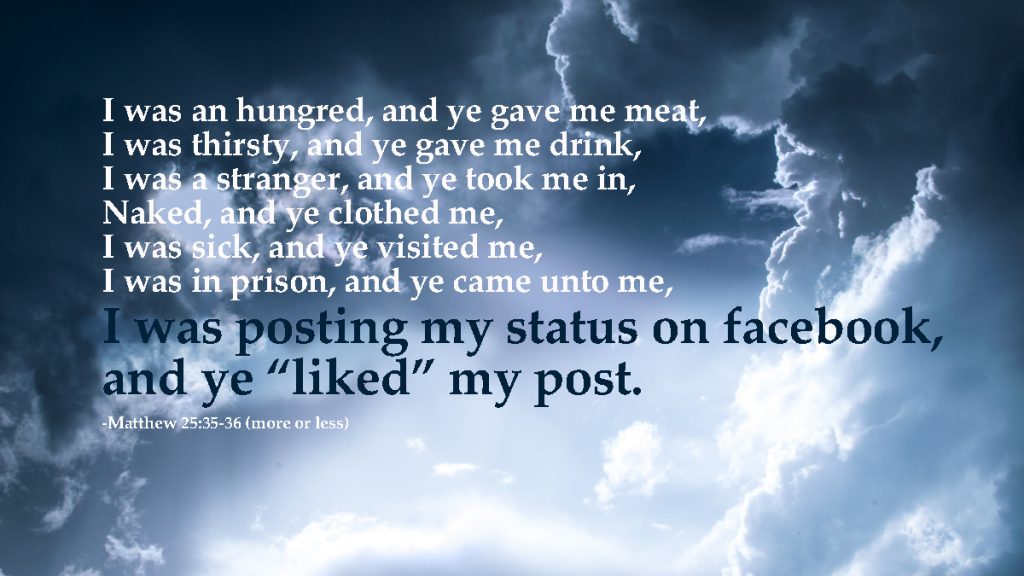At April 2018 General Conference, church leaders announced a new effort called “ministering” that would replace the home teaching/visiting teaching program. Details about the new program are available at www.lds.org/mycalling/ministering.
This video shares highlights from this announcement and includes illustrations of church members engaged in a variety of activities which might be considered “ministering.”
https://youtu.be/GVMcDdTAavM
Note: In many church buildings, you must download videos to your device beforehand; you cannot play videos directly from the Internet. You can download this video here. Choose the “full video” version for the complete 4 1/2 minute video. https://www.lds.org/mycalling/ministering/a-vision-of-ministering?lang=eng
After watching the video, discuss:
- How do you feel about the announcement of the ministering program?
- What do you like about it ?
- What are your misgivings?
- What will we need to do to make this new effort work in our local ward or branch?
Some class members may have concerns about the new program. That is okay. Talking through concerns is an important part of adjusting to change and should not be discouraged.
While the ministering program is just beginning to be rolled out churchwide, the Relief Society General Presidency has already moved toward the ministry model since January 2018, when they discontinued formal visiting teaching lessons. At that time, they explained:
“We want to help sisters understand how to really care for and strengthen each sister. The handbook doesn’t talk about our responsibilities to teach a lesson. It talks about how ‘visiting teachers sincerely come to know and love each sister, help her strengthen her faith and give service. They seek personal inspiration to know how to respond to the spiritual and temporal needs of each sister they are assigned to visit.'” –Sister Jean B. Bingham, General Relief Society President
“What are we supposed to do? Do what she needs.” –Sister Sharon Eubank, First Counselor in the Relief Society General Presidency
Discuss:
- How are your efforts at ministry going so far? What is working for you? What are you struggling with?
- How do we know what others need? What do we need to do to understand their needs?
- How can we come to sincerely know and love people we are assigned to minister?
While this particular ministering program is new, we have all been called to ministry ever since we became members of the church. Consider how Alma described the baptismal covenant:
…and now, as ye are desirous to come into the fold of God, and to be called his people, and are willing to bear one another’s burdens, that they may be light;
Yea, and are willing to mourn with those that mourn; yea, and comfort those that stand in need of comfort, and to stand as witnesses of God at all times and in all things, and in all places that ye may be in, even until death, that ye may be redeemed of God, and be numbered with those of the first resurrection, that ye may have eternal life—
Now I say unto you, if this be the desire of your hearts, what have you against being baptized in the name of the Lord, as a witness before him that ye have entered into a covenant with him, that ye will serve him and keep his commandments, that he may pour out his Spirit more abundantly upon you? Mosiah 18:8-9
- What does is mean to bear one another’s burdens?
- To mourn with those who mourn?
- To comfort those who stand in need of comfort?
- To stand as a witness of God?
As Mormons, using the word “minister” is new to us, but within other faiths, people have been accepting the call to ministry and considering what it means to them for a long time. What can our friends of other faiths teach us about ministering?
“I sat in one of those ‘pastoral identity’ lectures. As I listened to the professor talk about a pastor’s call to guide, protect, nurture, and grow God’s people, the woman next to me nudged me with her arm, ‘Sounds a lot like being a mother,’ she smirked. I smiled back at her, absorbing this information.” –Kate Wallace Nunneley, Evangelical Associate Pastor
(Check out our interview with Pastor Nunneley here.)
“Youth ministry is about making real the teachings of Jesus. It requires that I consistently strive to be in touch with the Divine so that through our ministries, youth might get a glimpse of what it would be like to walk and talk and eat pizza with Jesus. Youth ministry allows us to walk with our youth through the most important developmental phase of their life. It takes us on mission trips and retreats, to birthday parties, and graduations. But it also takes us to cancer wards, juvenile detention centers, funerals, and social services agencies. And it takes us to the feet of Jesus and the throne of God. This is what youth ministry is to me. It is about creating sanctuary—safe places for our youth to come and rest from the pressures of school, the stress of family, the confusion of adolescence, and to be exactly who they are: amazing creations of God.” –Lara Crutsinger-Perry, Minister to Youth and Families, United Church of Christ
The words “minister” and “servant” are used interchangeably in scripture. (See this article, Ministry Means Service, for more information about the greek origins of the word “minister.”)
Christ gave some beautiful examples of ways we could minister to others when he told this story to his disciples:
Then shall the King say unto them on his right hand, Come, ye blessed of my Father, inherit the kingdom prepared for you from the foundation of the world:
For I was an hungred, and ye gave me meat: I was thirsty, and ye gave me drink: I was a stranger, and ye took me in:
Naked, and ye clothed me: I was sick, and ye visited me: I was in prison, and ye came unto me.
Then shall the righteous answer him, saying, Lord, when saw we thee an hungred, and fed thee? or thirsty, and gave thee drink?
When saw we thee a stranger, and took thee in? or naked, and clothed thee?
Or when saw we thee sick, or in prison, and came unto thee?
And the King shall answer and say unto them, Verily I say unto you, Inasmuch as ye have done it unto one of the least of these my brethren, ye have done it unto me. -Matthew 25:34-40
In our modern world, the means by which we may minister have expanded.
“In addition to whatever schedule you establish for actual visits, that calendar can be supplemented with telephone calls, written notes, texts, emails, video chats, conversations at Church meetings, shared service projects, social activities, and a host of possibilities in the world of social media.” -Elder Jeffrey R. Holland

Not every act of ministering needs to be a grand gesture.
“Sometimes we think we have to do something grand and heroic to ‘count’ as serving our neighbors. Yet simple acts of service can have profound effects on others—as well as on ourselves. What did the Savior do? Through His supernal gifts of the Atonement and Resurrection—which we celebrate on this beautiful Easter Sunday—’none other has had so profound an influence [on] all who have lived and who will yet live upon the earth.’ But He also smiled at, talked with, walked with, listened to, made time for, encouraged, taught, fed, and forgave.” –Sister Jean B. Bingham, General Relief Society President
- What are some ways others have ministered to you or those around you?
- How can our ministering help meet people’s spiritual and temporal needs?
- How can it help people come closer to Christ?






9 Responses
I’m probably the only person that feels this way but there are several things I do not like about the new program.
1) Mormons are so over-scheduled that they are by nature, task/duty oriented. If it isn’t an assignment and there is no accountability it will fall through the cracks. The things about having assigned monthly visits was that it did get people off their butts to reach out. I don’t think people will do that on their own.
2) I really don’t like that idea of adding young women to the mix. It tells me we aren’t really interested in the needs of the sisters being visited. We have another motive – to yet again, put the youth above the needs of older members. As a single, never-married, childless women, and really have no interested in bearing my soul to a teenage girl.
Lily, you are not alone. I agree. I moved to a new ward a year ago and my visiting teachers have come once. I don’t think they will come at all as ministers with no accountability.
I have loved visiting teaching in the past. I’ve gotten so close to the sisters I visit by talking heart to heart. We certainly aren’t going to do that with a teenager in the room.
I think the church is desperate to keep girls from leaving when they enter RS and think this might help ease the transition. I don’t know if it will do that, but I don’t think that is the point of visiting teaching, and certainly won’t be ministering to most of the sisters.
Just wanted you to know you aren’t the only one.
[…] check out our intro Relief Society lesson about ministering–more to […]
I am not understanding the “no accountability” comments.
This is ALL about accountability. However, the accountability is qualitative not quantitative.
Ministering Interviews are the only quantitative metric – so they HAVE to happen. This will mean Ministering Companionships being called to account for the well-being of those they have been assigned to. But it will not be about “did you visit?”, it will be about “where are they physically, mentally, emotionally and spiritually?” “What are their needs?” “Do you need help?”
I don’t think the idea is that anyone will bear their soul to a teenager. But more than the Young Women may assist with the ministering needs. Recently my 17 year old daughter spent three weeks dog walking for a widower on my home teaching list. She is not a dog person, we have never had a dog. However, she performed the task well and the brother in question was most grateful.
We don’t need schedules, lists, and so forth. We need to Minister.
Andrew, if you are indeed the Andrew I’m thinking of, I feel I have spent ages disagreeing with you. But today, oh happy Sabbath! we agree! Unity! I’m in my ward’s Relief Society Presidency and we’ve started doing the ministering interviews. The first round has been more evaluating where things stand so that we can adjust assignments, but I think going forward this is a lot more substantive. The interview questions we have, based on trainings and GC talks and our own discussions focus on much more important issues than “was it a letter or a visit.” We’ve talked about what spiritual goals sisters have, and what we’re doing to support and minister. We’re talking about temporal goals. Yesterday a sister wore her 5k medal to a RS activity and we cheered and were thrilled — she has always been sedentary and is now working on living a fit life. I have had sisters telling me they need someone who can model sincere friendly prayer that isn’t intimidating. Sisters are asking for help being accountable with scripture study. I feel like for the first time in a long time we’re actually hearing “this is what I need, can I have help?” in real meaningful ongoing ways.
I also think the monthly visit will still play a role. I have several older sisters who have said what they want from a ministering sister is someone to sit down with them and chat on the couch once a month.
I think people chose not to visit teach and felt guilty and the monthly nag didn’t fix that. People will choose not to minister and the ministering interview is not going to change that either. But I have high hopes that this new program will be a higher law and a better day for us.
I loved this lesson plan and, although for RS, I will be using it Sunday for my Quorum. (For those who have seen me post before – I am the new EQP in my ward.)
Wow! Congrats on the calling, Andrew! I hope you make some feminist inroads in the work you do!
The most exciting part of this calling, and the new Ministering system, is that I will be working together with the RSP. She has been in her calling for 3+ years and I have told the Bishop he is not to release her. She is a superb president and working with her to help provide ministering to the ward members will be a privilege.
[…] talked about what ministry is, how Christ ministered, and how this is God’s […]